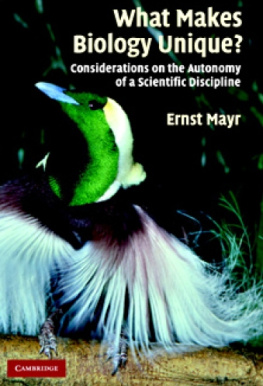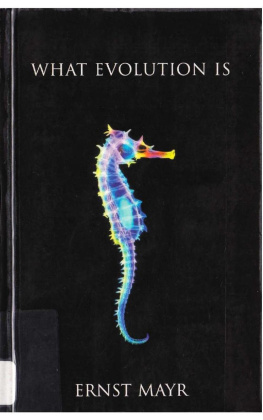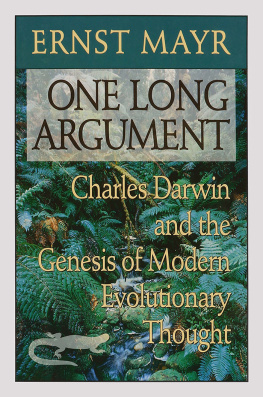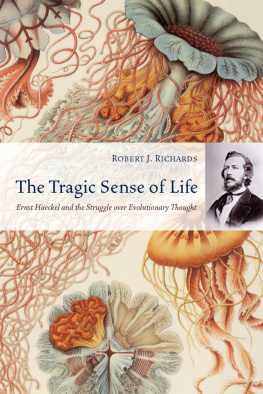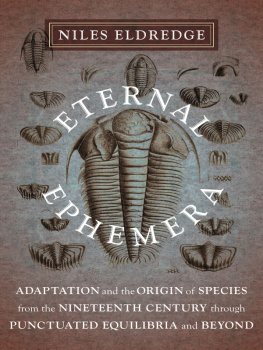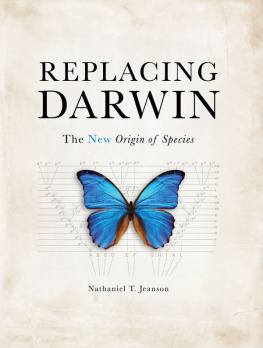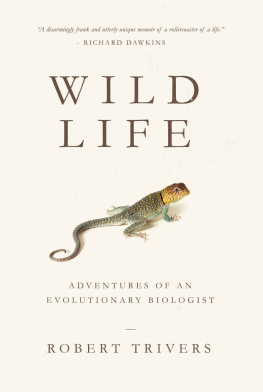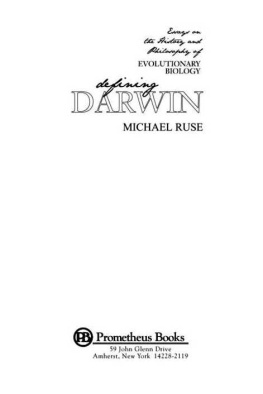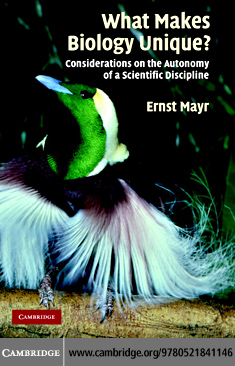. Science and sciences
. The autonomy of biology
. Teleology
. Analysis or reductionism?
. Darwin sin fl uence on modern thought
. Darwin s fi ve theories of evolution
. Maturation of Darwinism
. Selection
. Do Thomas Kuhn s scienti fi c revolutions take place?
. Another look at the species problem
. The origin of humans
. Are we alone in this vast universe?
Preface
T his will be my last survey of controversial concepts in biology. I have previously published papers on nearly all these subjects, in some cases more than one. Indeed, an analysis of my bibliography reveals that I have discussed the species problem in no fewer than sixty-four of my publications, and have been involved in numerous controversies. What I now offer is a revised, more mature, version of my thoughts. I am not so optimistic to believe that I have settled all (or even most) of these controversies, but I do hope to have brought clarity into some rather confused issues.
What I do not understand is why most philosophers of science believe the problems of the philosophy of science can be solved by logic. Their interminable arguments, documented by whole issues of the journal Philosophy of Science , show that this is not the best way to reach a solution. An empirical approach (see, for example, chapter for teleology and chapter for reduction) seems to be a better way.
Indeed, this conclusion raises a legitimate question whether the traditional approach of the philosophy of science is really the best possible one. This possibility must be faced if one plans to develop a philosophy of biology. The traditional approach is based on the assumption that biology is a science exactly like any of the physical sciences, but there is much evidence to question this assumption. This raises the troubling question of whether one should not choose a different approach for the construction of a philosophy of biology from the one hitherto traditional in the philosophy of science. An answer to this question requires a deep analysis of the conceptual framework of biology and its comparison with the conceptual framework of physics. Such an analysis and comparison apparently have never been made. To do that is the major objective of this work.
During this task I discovered that throughout biology there are numerous unresolved controversies dealing with problems such as the species problem, the nature of selection, the use of reduction, and several others. It is necessary to obtain clarity on these problems before one can deal with the problem of the status of biology compared with various physical sciences. Any uncertainty about some minor problem may be used by some opponents of certain major theories of biology to reject that basic theory. This has happened particularly often with Darwinism as a whole. There are still some uncertainties about some evolutionary phenomena like the con fl ict between the explosive speciation of cichlid fi shes in the lakes of eastern Africa and the stasis of the phenotype in living fossils, but the validity of the basic Darwinian paradigm is now so fi rmly established that it simply cannot be questioned any longer.
However, the critical analysis of the controversial problems discussed in chapters will help to clarify some obscure points. At fi rst sight, bringing the topics of these chapters together would seem to produce disturbing heterogeneity. More detailed study shows, however, that the conclusions reached in each of these chapters make an important contribution to our understanding of evolution as a whole. Those who are teaching a course on the history and philosophy of biology will fi nd the chapters on the maturation of Darwinism, on selection, and on the evolution of the human particularly helpful. These chapters also supplement treatments of these subjects in What Evolution Is (Mayr 2001 ).
literature cited Mayr, E. 2001 . What Evolution Is . New York: Basic Books.
Acknowledgments
T his work , the product of nearly eighty years of study, owes a great debt of gratitude to scores of friends and mentors. Most of you are no longer with us, such as Erwin Stresemann, Bernard Rensch, Theodosius Dobzhansky, Michael Lerner, James P. Chapin, J. B. S. Heldane, E. B. Ford, David Lack, Konrad Lorenz, Niko Tinbergen, and so many others. Fortunately there are some to whom I can say my thanks in person. Walter Bock is the one to whom I owe the most. He has read my draft manuscripts critically and I have greatly bene fi ted from his constructive suggestions. I frequently consulted Francisco Ayala, Jared Diamon, Doug Futuyma, Michael Ghiselen, Verne Grant, Axel Meyer, David Pilbeam, Frank Sulloway, and Bruce Wallace and always received useful information and constructive advice. I also consulted Fred Burkhardt, J. Cain,

